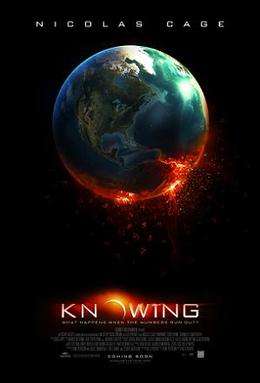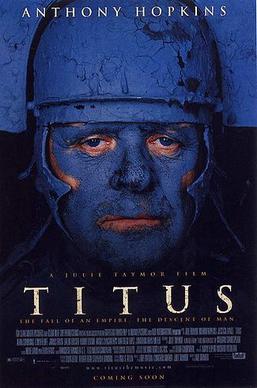I am not sure if this is going to be a monthly thing or not – I have revisited this blog several times, before life picks up again and I find myself not particularly inspired to continue. Last month I wrote about how I had watched a new film every day – a feat that I did not match this month, although I came pretty close, watching twenty new films in the first twenty-four days. Tomorrow I beginning a hitchhiking tour around Germany, so I thought I would do my essay on this month's films a week early.

It was hard for me to pick a favorite – The Fallen Idol, Dial M for Murder, Ben-Hur, The Bride of Frankenstien, Life is Sweet, The Hidden Fortress, Titus and Wings of Desire were all amazing films in their own way, but the film I want to write about is Dark City. It might be because I didn’t have any expectations – released around the same time as The Matrix, it seemed to me from the trailer as if Dark City was trying to cash in on some of that hype. It wasn’t. Dark City is one of the most original films I have seen in ages, and it was clear from watching it how much other films have stolen from it – films like Memento, Sin City, and Ink. Our leading character, John Murdoch, wakes up in a bathtub with no memory of who he is. There is a dead prostitute in his bedroom, and it sure looks like he killed her. A phone rings and tells him to run, so he does. There is a Taoist saying that goes “things are not as they seem, nor are they otherwise.” That applies to this film. There is no dramatic irony, we figure everything out as Jack does. He lives in a noir city where it is always night, where nobody seems to remember how to leave, and there is always a feeling of deja vu. To elaborate anymore would ruin the experience, so I don’t want to say anything else, except that if you are bored of cinema that paints by numbers and never takes any risks with the stories, watch this film.

I was skeptical of Dark City because I am not a fan of Alex Proyas’ body of work – I remember The Crow being one dimensional and silly, and I, Robot seems like typical Will Smith popcorn cinema. However, I decided after Dark City that I would give his 2009 film Knowing a chance. I know I am in the minority but I am a fan of Nicolas Cage, and although the film received poor reviews, the late Roger Ebert had given it a very enthusiastic endorsement, so I decided to give it a chance. After watching Dark City I was hoping for something as intricate and as moving – I was disappointed. Proyas certainly shows ambition with Knowing, he explores whether our universe is random or deterministic, but ultimately leaves us bored. The characters are unlikeable, the special effects are unconvincing, and the child acting is annoying. I am undecided whether or not I disliked this or The Usual Suspects more, but this was definitely the disappointment of the month.

I saw The Grand Budapest Hotel the other day with my friend Phil, the first Wes Anderson film I have seen in cinemas. I always want to like his films more than I do – he writes great characters without getting caught up in their back stories, he can write hilarious and moving dialogue, and his plots are always very intricate, but his direction ruins his work for me. He only has one speed, intense, and I think the films would be a lot better if he didn’t feel the need to focus so much on superfluous set decorations or bright colors. I think he gets in the way of his own stories, if he would not indulge every whim he would be a great director. Not to say this was a bad film – I liked it more than any of films since Rushmore – but it could have been a great film.

I watched three Roman epics this month – Ben Hur, The Fall of the Roman Empire, and Titus. Ben Hur doesn’t need me to say anything about it, it is a classic, The Fall of the Roman Empire had some great scenes with Alec Guiness as the Emperor Marcus Aurelius, but it was Titus that really caught me off guard. Based on William Shakespeare’s Titus Andronicus, this is one of the most violent stories ever told. There are scenes of gang rape, incest, cannibalism, filicide, self performed amputations, and torture. Anthony Hopkins portrays Titus, a Roman General who has lost twenty-one of his twenty-five children in war against the Goths – before the film is over, he will lose three more. Typically I detest violence in films, but as this is Shakespeare, there is a lot more going on here – there is no point to this brutality, and there are no heroes - it is an honest portrayal of Roman brutality, one that no other modern story about ancient Rome can match. Titus is not set in ancient Rome, however – we’re not quite sure when it is set - there is a mix of Ancient Roman, Tudor England, 1950s England and 1980s American aesthetics. Whereas I wished above that Wes Anderson could show some restraint, I applaud Julie Taymor’s idiosyncratic vision, and don’t think that an adaptation of the Bard’s play could possibly be done with good taste.
That is it for this month. I do not know if I can keep up this pace for April, but if I do I will be sure to write about it.
March: The Fallen Idol (1948), Life is Sweet (1990), The Usual Suspects (1995), Dial M for Murder (1954), Frankenstein (1931), Bride of Frankenstein (1935), Ben-Hur (1959), The Wind That Shakes the Barley (2006), The Hidden Fortress (1958), The Fall of the Roman Empire (1964), Persepolis (2007), Titus (1999), Stalag 17 (1953), Interiors (1978), Dark City (1998), Knowing (2009), We Have A Pope (2011), Reality 86’d (1991), The Grand Budapest Hotel (2014), Wings of Desire (1987).
It was hard for me to pick a favorite – The Fallen Idol, Dial M for Murder, Ben-Hur, The Bride of Frankenstien, Life is Sweet, The Hidden Fortress, Titus and Wings of Desire were all amazing films in their own way, but the film I want to write about is Dark City. It might be because I didn’t have any expectations – released around the same time as The Matrix, it seemed to me from the trailer as if Dark City was trying to cash in on some of that hype. It wasn’t. Dark City is one of the most original films I have seen in ages, and it was clear from watching it how much other films have stolen from it – films like Memento, Sin City, and Ink. Our leading character, John Murdoch, wakes up in a bathtub with no memory of who he is. There is a dead prostitute in his bedroom, and it sure looks like he killed her. A phone rings and tells him to run, so he does. There is a Taoist saying that goes “things are not as they seem, nor are they otherwise.” That applies to this film. There is no dramatic irony, we figure everything out as Jack does. He lives in a noir city where it is always night, where nobody seems to remember how to leave, and there is always a feeling of deja vu. To elaborate anymore would ruin the experience, so I don’t want to say anything else, except that if you are bored of cinema that paints by numbers and never takes any risks with the stories, watch this film.

I was skeptical of Dark City because I am not a fan of Alex Proyas’ body of work – I remember The Crow being one dimensional and silly, and I, Robot seems like typical Will Smith popcorn cinema. However, I decided after Dark City that I would give his 2009 film Knowing a chance. I know I am in the minority but I am a fan of Nicolas Cage, and although the film received poor reviews, the late Roger Ebert had given it a very enthusiastic endorsement, so I decided to give it a chance. After watching Dark City I was hoping for something as intricate and as moving – I was disappointed. Proyas certainly shows ambition with Knowing, he explores whether our universe is random or deterministic, but ultimately leaves us bored. The characters are unlikeable, the special effects are unconvincing, and the child acting is annoying. I am undecided whether or not I disliked this or The Usual Suspects more, but this was definitely the disappointment of the month.

I saw The Grand Budapest Hotel the other day with my friend Phil, the first Wes Anderson film I have seen in cinemas. I always want to like his films more than I do – he writes great characters without getting caught up in their back stories, he can write hilarious and moving dialogue, and his plots are always very intricate, but his direction ruins his work for me. He only has one speed, intense, and I think the films would be a lot better if he didn’t feel the need to focus so much on superfluous set decorations or bright colors. I think he gets in the way of his own stories, if he would not indulge every whim he would be a great director. Not to say this was a bad film – I liked it more than any of films since Rushmore – but it could have been a great film.

I watched three Roman epics this month – Ben Hur, The Fall of the Roman Empire, and Titus. Ben Hur doesn’t need me to say anything about it, it is a classic, The Fall of the Roman Empire had some great scenes with Alec Guiness as the Emperor Marcus Aurelius, but it was Titus that really caught me off guard. Based on William Shakespeare’s Titus Andronicus, this is one of the most violent stories ever told. There are scenes of gang rape, incest, cannibalism, filicide, self performed amputations, and torture. Anthony Hopkins portrays Titus, a Roman General who has lost twenty-one of his twenty-five children in war against the Goths – before the film is over, he will lose three more. Typically I detest violence in films, but as this is Shakespeare, there is a lot more going on here – there is no point to this brutality, and there are no heroes - it is an honest portrayal of Roman brutality, one that no other modern story about ancient Rome can match. Titus is not set in ancient Rome, however – we’re not quite sure when it is set - there is a mix of Ancient Roman, Tudor England, 1950s England and 1980s American aesthetics. Whereas I wished above that Wes Anderson could show some restraint, I applaud Julie Taymor’s idiosyncratic vision, and don’t think that an adaptation of the Bard’s play could possibly be done with good taste.
That is it for this month. I do not know if I can keep up this pace for April, but if I do I will be sure to write about it.
March: The Fallen Idol (1948), Life is Sweet (1990), The Usual Suspects (1995), Dial M for Murder (1954), Frankenstein (1931), Bride of Frankenstein (1935), Ben-Hur (1959), The Wind That Shakes the Barley (2006), The Hidden Fortress (1958), The Fall of the Roman Empire (1964), Persepolis (2007), Titus (1999), Stalag 17 (1953), Interiors (1978), Dark City (1998), Knowing (2009), We Have A Pope (2011), Reality 86’d (1991), The Grand Budapest Hotel (2014), Wings of Desire (1987).
Comments
Post a Comment